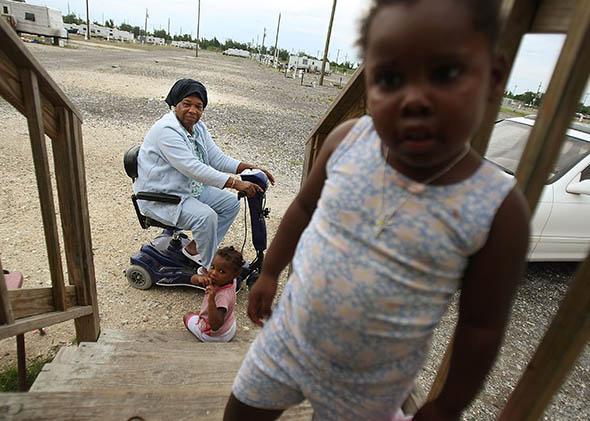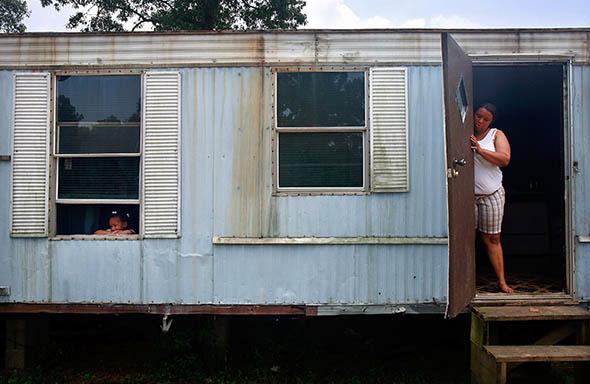The economy is growing, a presidential election is on the horizon, and Republicans are finally tackling income inequality as a national problem.
Earlier this month former Florida Gov. Jeb Bush launched his new PAC with a message geared toward economic insecurity: “While the last eight years have been pretty good ones for top earners, they’ve been a lost decade for the rest of America.” Last Friday former Massachusetts Gov. Mitt Romney talked up inequality, telling a Republican audience in San Diego, “Under President Obama, the rich have gotten richer, income inequality has gotten worse, and there are more people in poverty than ever before.”
For as odd as it is to hear Romney (of “47 percent” fame) disdain the plutocratic economy, it’s also a welcome change. After 15 years of bad economic news—from sluggish growth and wage stagnation to a world-historical recession—we are finally at a point of real progress. Now is the time to talk frankly about what we need to further our gains and ensure broad prosperity. And, sincere or not, it’s good that Republicans want to be part of that conversation. At its best, conservative thinking on inequality puts a laser focus on the particular problems of families. “Perhaps the most basic challenge facing middle-class families,” said Utah Sen. Mike Lee in an expansive speech to the Heritage Foundation in October 2013, “is how expensive it has become for couples to simply start and grow their families.”
And while liberals will not agree with Republican prescriptions, there’s real value in their critiques and counterproposals. For example, one of the smarter conservative criticisms of President Obama’s plan for larger child and child care tax credits is that they penalize stay-at-home parents. Specifically, Obama’s plan would give new tax credits to dual-income families as well as provide larger credits to parents who need child care to do paid work. But if a family chooses to forgo market income by having a parent stay home, it loses these credits.

Photo by Mario Tama/Getty Images
Now, this might be the right move. While leaving the market lowers family income, it’s also true that it gives certain benefits—free child care—that aren’t taxed. The value of those benefits might be equal to the credits available to a two-income family. Which is to say that, in a final accounting, both kinds of families might end up in the same place. Still, for liberals who want to support a variety of family types, this is a serious oversight, and it’s good that Republicans are there to highlight the blind spot.
Likewise, in engaging the inequality question, there are places where the GOP could stand to rethink its approach. One of the worst features of Republican tax reform on the state level is the reliance on sales and excise taxes to make up for cuts elsewhere. Before he shelved it, Louisiana Gov. Bobby Jindal’s tax plan would have phased out state income and corporate taxes and replaced them with higher and broader sales taxes. Likewise, in Kansas, Gov. Sam Brownback has pursued tax reform that does the same.
The problem is that this shifts the tax burden from the top to the bottom. In other words, it’s upward redistribution of wealth that harms the least well-off. And while the vast majority of states have tax systems that hit low-income Americans the hardest, these effects are worst in conservative states, where the highest tax burdens are on the poorest residents. Of the 10 states with the highest taxes on the poor, according to a recent study by the Institute on Taxation and Economic Policy, eight—Florida, Texas, South Dakota, Pennsylvania, Tennessee, Arizona, Kansas, and Indiana—have had unified Republican control in the last six years.
It’s true that many liberal states—like Washington, Maryland, and Massachusetts—have high tax burdens on the poor. But they couple these with generous social services. The same isn’t true in conservative states, which combine regressive taxes with sparse benefits, leaving low-income residents with high taxes and little to show for it.
None of this causes inequality. But it certainly doesn’t help, and it wouldn’t be hard for Republicans (and Democrats, too) to either move away from sales taxes or increase benefits for low-income residents to compensate for disproportionate tax burdens.
At the least, it needs to be on the radar. Tax systems are statements of our priorities as much as they’re ways to raise revenue, and judging from the taxes we impose on the poor, we’re not too interested in providing a path out of poverty. If it does anything, a national debate over inequality might bring this particular problem into focus.
Indeed, genuine debate might bring a whole host of problems to the forefront: things we’ve ignored, downplayed, or treated as nonissues. And while Republicans are a little late to the inequality conversation, their growing presence is a sign that action could happen. For liberals who have long engaged these problems, and who are fighting on friendly territory, this is a good thing.
